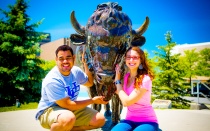University at Buffalo (UB)
Program Requirements and Curriculum
The following serves as a guide for students to complete the Clinical Psychology Doctoral Program successfully.
Requirements for Degree Completion
- A minimum of 72 credit hours, including core cognitive coursework, electives and departmental breadth requirements.
- Psy 604 Research Methods in Clinical Psychology
- Psy 607 Advanced Statistical Methods I
- Psy 608 or 613 Advanced Statistical Methods II
- Psy 609 Multivariate Statistics
- Psy 617 Advanced Developmental Psychology
- Psy 624 Clinical I: Psychopathology
- Psy 654 Clinical II: Psychological Assessment
- Psy 751 Clinical III: Clinical Treatments: Adult
- Psy 778 Clinical IV: Clinical Treatments: Child & Family
- Psy 611 History & Systems
- Psy 671 Intervention I
- Psy 672 Intervention II
- Psy 763 Intervention III
- Psy 764 Intervention IV
- One Clinical Elective (The following electives have been taught over the past 5 years: Psy 614 Structural Equation Modeling; Psy 618 Developmental Psychopathology; Psy 868 Teaching Psychology; Psy 868 Social Withdrawal, Shyness, and Social Anxiety; Psy 868 Clinical Psychophysiology)
- Distribution in Biological Bases of Behavior (PSY 513 Biological Bases of Behavior)
- Distribution in Cognitive Bases of Behavior (PSY 639 Cognitive Processes)
- Distribution in Social-Affective Bases of Behavior (PSY 680 Advanced Social Psychology)
- A preliminary requirement consisting of three components: a second-year research project, a third-year research project, and a clinical competency requirement.
- A doctoral dissertation and oral defense of the dissertation.
- A one-year, APA-approved, clinical internship.
Completion Timeline
The curriculum is sequential and designed to provide students with a strong foundation in the science and practice of clinical psychology.
- In the first year, core coursework focuses on the introduction to psychopathology, assessment, and intervention, as well as statistics and research methods in clinical psychology.
- During the second year, core coursework focuses on advanced statistics, psychological interventions with adults and children, and a full year of practicum training in assessment and intervention.
- In the third year, students continue clinical practica and complete all remaining coursework.
- Clinical electives also are offered on a variety of topics, and the curriculum includes breadth courses in the history of clinical psychology as well as the biological, cognitive-affective, and social bases of behavior.
- Ethics and diversity are infused throughout the core curriculum. Our program recognizes cross-cultural issues in clinical research and practice and in our curriculum, and welcomes cultural diversity among our students and the clinical populations we serve.
- Clinical training places a heavy emphasis on the scientific foundations of clinical psychology; students are trained to use empirically supported assessment and treatment practices. Clinical training occurs in the in-house Psychological Services Center, a wide range of advanced external practica, and optional lab-based clinical experiences.
For detailed information about specific courses, requirements, and sequence of training experiences, please refer to the Clinical Psychology Student Handbook.

